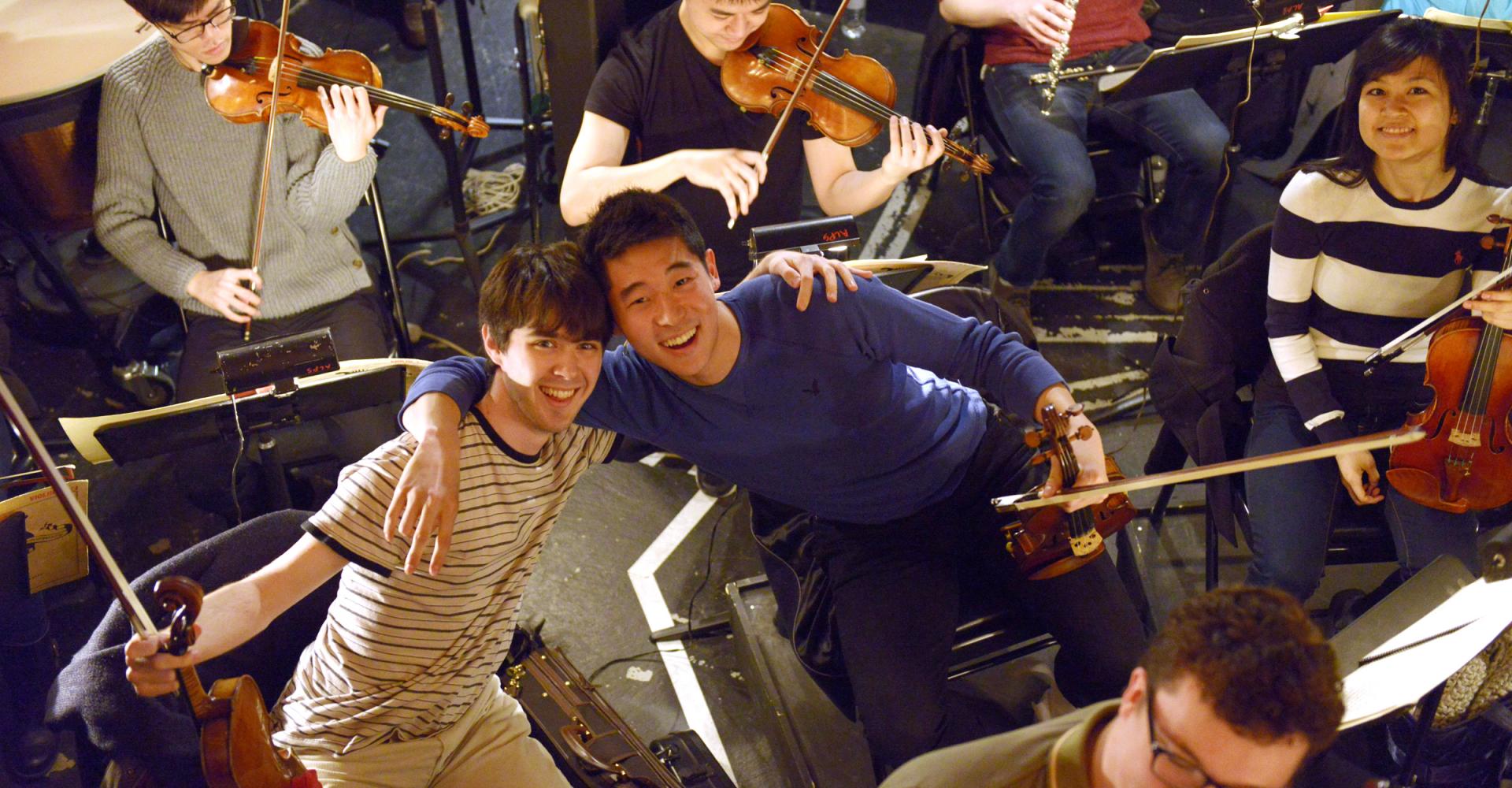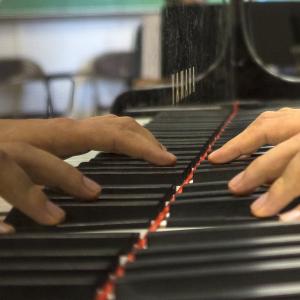NEC RESIDENCE HALL:
All undergraduate students live in the NEC Residence Hall the first 4 semesters of enrollment at NEC. Other students live in the Residence Hall as space permits. Approximately 30% of the Residence Hall is made up of international students.
Each of the floors has a resident advisor to help students. One is always available in the evenings and during the weekend. The Director of Residence Life and Housing is available weekdays between 9:00am and 5:00pm.
The Residence Hall has a number of student activities throughout the year including ice cream socials, movies, speakers and group discussions.
OFF-CAMPUS HOUSING:
The Off-Campus Housing Guide is available on-line through the Student Life link at
https://necmusic.edu/off-campus-housing. This guide provides important information about pricing, neighborhoods, real estate agents and leases.
Outside listings for apartments or persons seeking roommates appear daily in the Boston Globe, and the Boston Herald and weekly in the Boston Phoenix. On-line listings can also be found at https://boston.craigslist.org/ and https://www.bostonapartments.com.
Please note that New England Conservatory neither accepts nor creates any responsibility for the reliability of the information that is provided from these sources. Students must accept responsibility for contacting, negotiating, or communicating with rental agents, property owners, potential roommates, or others listed in the off-campus housing information at any time before, during, or after any off-campus housing agreement.
Boston is a pedestrian friendly city and NEC is located right near the center of it all. Bikes are hugely popular in Boston, and the city just opened a bike share program at https://www.bluebikes.com/. Students are cautioned to be aware of their surroundings while traveling through the city and watch out for car, bike, bus, and pedestrian traffic.
PUBLIC TRANSPORTATION:
The MBTA (Massachusetts Bay Transportation Authority)-a system of subways and buses-operates between 5:30am and 1:00am. Stations link Boston and surrounding suburbs. There are many kinds of passes that are subway-only to combo passes for transportation on the city’s entire network of subways, buses, and commuter trains. For information, maps, and schedules, visit the MBTA online at http://mbta.com. NEC offers discounted MBTA Link passes at https://necmusic.edu/t-pass-program. Passes must be ordered in advance of each semester. Students living on or very close to campus probably do not need a T-Pass and would be better advised to purchase a pay-as-you-go Charlie Card upon arrival to Boston.
DRIVING IN BOSTON:
The Registry of Motor Vehicles (RMV) provides a list of approved international driver’s licenses at https://www.massrmv.com/rmv/forms/21317.pdf. If on the list, you are permitted to drive in the US with your foreign driver’s license and 1-94 record for 1 year after each time you arrive in the US If you wish to obtain a Massachusetts’s Drivers License, you may do so by passing the written test and road examination at the RMV. Check their website https://www.mass.gov/rmv for more information.
EXPLORING GREATER BOSTON AND BEYOND:
Boston is a great city but sometimes you want to get out! You can easily get to the airport for flights, to North or South Station for Amtrak trains, or find inexpensive bus routes to New York City, Washington, DC, Philadelphia, and New England. You can also rent a car for short-term travel of a few hours to several days. Check out Zipcar.com for a popular car sharing company which allows foreign drivers to sign up.
Medical Insurance:
In the United States, medical care is not publicly funded; patients must either have full medical insurance or pay the costs - often quite high - themselves. The US government therefore requires all students to have comprehensive medical health insurance policies.
Due to Massachusetts state health care regulations and NEC policy, all international students are required to enroll in the New England Conservatory Student Health Insurance plan through Gallagher Student Health Insurance. For more details about this plan, please visit https://necmusic.edu/student-health-insurance-plan.
International students must also purchase health insurance for spouses or children accompanying them to the United States. Dependents are not automatically included in the individual health plan. There will be an additional charge for dependents’ insurance.
THE NEC HEALTH AND COUNSELING CENTER:
The NEC Health and Counseling Center provides licensed medical and psychological care to all NEC students. A doctor and nurse practitioners are on site to provide basic and preventative care. A staff of trained mental health professionals is available by appointment. All counseling services are free of charge, private and confidential.
The NEC Health and Counseling Center is located in Room 112 at the 241 St. Botolph Street Building. To schedule an appointment with the Health and Counseling Center, call (617) 585-1284.
BANKING:
One of the first things you should do after your arrive in the United States is establish a bank account. It is not a good idea to carry large amounts of cash or keep it in your living quarters.
It is relatively simple to open a bank account in the US. However, you should remember that banks are private businesses. Each offers different services and each wants your business. You should check with several banks to determine which one best meets your needs. During Orientation Central there will be representatives from local banks available to open accounts.
PHONE:
It is highly encouraged to purchase a US cell phone within the first few weeks of your program. Some cell phone carriers will require a social security number to activate the plan, so be sure to shop around as needed. Common carriers are AT&T, Verizon, Sprint, TMobile, and Virgin Mobile. You may also want to check with current students for recommendations on coverage, rates and benefits.
LEGAL RIGHTS AND PROTECTIONS OF INTERNATIONAL STUDENTS IN THE US:
International Student Services assists international students in understanding and fulfilling their legal obligations while they are in the US. The staff is not responsible for enforcing immigration law, but is responsible for reporting any violation of student status through the SEVIS system. In case of any problem with immigration or other US laws, students should contact the International Student Services immediately. If the situation warrants it, the student may be referred to a private attorney for expert help and advice.
International students must maintain the student status under which a visa was granted. They must also observe immigration requirements and obey immigration laws and regulations. Recent changes in immigration laws make it imperative that each student stays in status by enrolling full-time and not working illegally. Students who fail to register with the International Student Services at the beginning of each semester may be terminated from the USCIS database (SEVIS). Breach of immigration status could result in revocation of your student visa and a ban on entering the United States for the foreseeable future.
Students who violate NEC’s rules face suspension or dismissal. For international students, that would mean the loss of student status. Therefore, although an international student cannot be deported for disobeying Conservatory rules, the possible loss of student status might lead to deportation. Similarly, if a sponsored student violates the regulations of the sponsoring agency, the agency might withdraw visa sponsorship, thereby putting the student in jeopardy.
PRIVATE AND IMMIGRATION ATTORNEYS:
There are times when NEC students will require the assistance of an immigration attorney to resolve issues or to apply for different visas. Students can consult with their International Student Advisor to determine if an attorney is required. Students should choose their attorney carefully based on their specific needs and make sure that the attorney is registered with the American immigration Lawyers Association (https://www.aila.org). International Student Services will host immigration attorneys on campus throughout the year to educate students on visas options in addition to the F-1 visa.
There are several music stores in the Boston area. NEC students often use the
stores listed below:
Books and scores for all NEC courses may be obtained at Music Espresso.
Music Espresso
(The Music Store at NEC)
33 Gainsborough Street,
1st Floor, Boston
(617) 424-9322
Carl Fischer of Boston
156 Boylston Street,
Boston
(617) 426-0740
Yesterday Music Service
1906 Massachusetts Avenue,
Cambridge
(617) 547-8263




